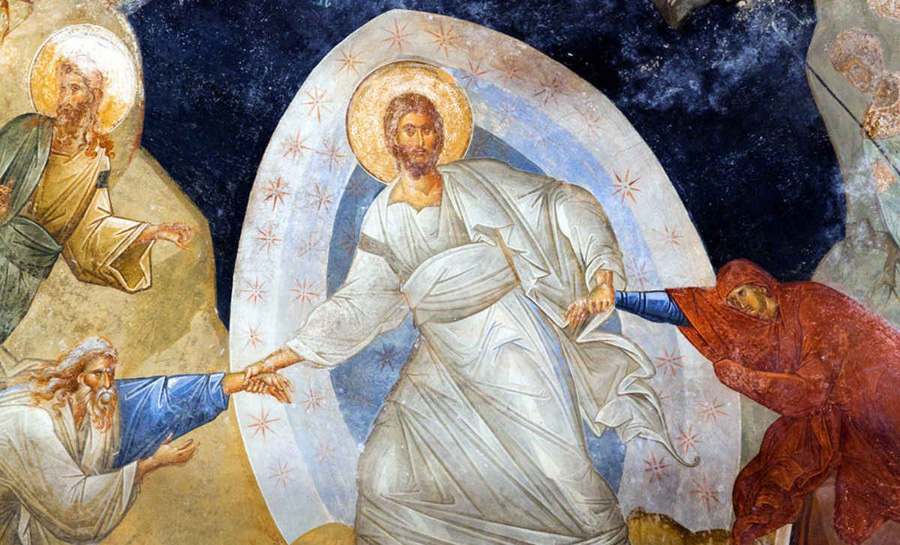 by Regis Martin –
by Regis Martin –
When the wise and virtuous men of old looked upon the world, they saw it in the light of eternity. In the shadow of that standard, blazing bright beneath the heavens, everything lay exposed, including the sins and pretensions of men. There was no escape for the self-centered self. Judgments were to be made solely in relation to reality, which the mind could know and the will could follow.
The only question worth asking was how to shape the human soul in order that it might conform, ever more perfectly, to reality—to Jesus Christ, in other words, who remains the supreme, abiding reality.
The standard, therefore, is not any sort of axiom or principle far above the flux, but a Person, the Incarnate God Himself, who freely plunges into that very flux in order to set us free for a life of unending glory. To recall the famous phrase of Irenaeus, “The glory of God is man fully alive.” Salvation becomes a work of recovery, then; of sheer repristination, whereby Christ, the New Adam, assumes our fallen state in order to return it to the innocence and joy of the Old Adam before that great train wreck of the Fall.
In Adam’s fall, we sinned all. We get to keep the image, by the way—the high destiny of imago Dei not having been blown apart by sin. But we lost the likeness, the similitude to God enjoyed by our first parents. And only through Christ may that likeness be restored. It is a work of recovery wrought by the grace of God, which Holy Church mediates in and through her sacraments—so many canonical channels of divine life to renew the springs that had tragically dried up. And the end result of all this? A life of virtue, fortified at every turn by the soul’s cleaving to Christ, who has come not just to carry us across the finish line but to accompany us every step of the way.
I come not only to know who I am in consequence of knowing Christ Jesus, but I know what I must now do, how I may at last achieve that perfect version of myself.
So, the real aim here is not just to tell us about virtue, instructing us in the upright habits of the soul, but to habituate our minds and hearts to the practice of virtue—to do so, moreover, in such a way that virtue becomes not a matter of hard and grim duty, but one of increasing ease and delight. Why shouldn’t the soul take pleasure in pleasing God? Where does it say that the pursuit of the good must always be arduous? Instead, let us set about acquiring entitative habits for those very virtues we seek to possess. That way, as Fr. John Hardon, SJ, explains, the sanctifying grace we get coursing through our lives, “becomes a permanent quality added to human nature, directly modifying its being (entity) rather than its operations, as in the case of the virtues.”
It is my being, not merely my behavior, that is changed, raised to the stature of Christ, who gives Himself to me in love. All I must do is try and love Him in return—never an easy assignment, to be sure. The prospect of putting on Christ remains a daunting challenge in every age. There will never be a time when the world, the flesh, and the devil go on holiday, leaving us blessedly alone with God. Sanctity has never been a snap.
But the ancients had an advantage over us. They had something that many of us appear to have lost: they actually believed in an objective order, the truth of which impressed itself upon them in so many obvious and inescapable ways. And they believed that to deny its strictures, deflecting one’s will in an unreal direction, would, if one were to persist in the waywardness of it, ultimately destroy the soul. They knew this. Thus, when they sinned, they experienced guilt and, not infrequently, the need to confess and repent.
How very unlike modern men our ancestors were! Rather than cultivating a life of wisdom and virtue, of conformity to the real, we are resolved to change reality, repealing the very constitution of being so as to make it conform to the wishes of ourselves. All the bastions, therefore, raised up to keep barbarism at bay, must be pulled down, leveled at once in order to give the pampered-self everything it wants.
There is no appetite, be it so perverse, that will be denied.
Are you unhappy with the sex assignment you received at birth? Then why shouldn’t you be allowed, encouraged even, to change it? And if the insurance company won’t pay for the procedure, then let the government (i.e., the tax payer) pick up the tab. Self-identity is all.
And what about that unborn child you’re stuck with? Why should you be saddled with an unwelcome burden? Flush it out, and while you’re at it, remind the moral busybodies that “My Body, My Choice” is not negotiable. Except, that is, when it comes to vaccine mandates for fighting Covid.
And when you grow weary of your spouse, why shouldn’t you do a trade-in for a newer model? Or suppose you’ve decided you’re not really straight after all? Why shouldn’t you be free to check out same-sex options? And why not include a sibling or two in the mix? Let it be consensual, of course, but clearly the time has come to phase out such antique superstitions as the Incest Taboo. Haven’t we been benighted long enough?
So, how’s it all working out for us so far? Indices of happiness have certainly not increased. Pathologies, meanwhile, have increased a hundredfold, their proliferation a matter of growing concern. Suicide rates, especially, have shot up—among the young in particular. If you have a why in your life, as a wise man once said, then you can cope with the how. But if the why isn’t there, if there’s no secure ground of meaning upon which to stand, then it matters not one whit how well you live.
You’re no better than poor Baron von Munchausen who, to prevent his sinking further and further into the bog, vainly grabbed hold of his beard. There are no human exertions available for any of us to pull ourselves out of that bog. Only God can save us now; He who has already come among us—as meaning, ground, Logos—to do just that. But we’ve got to let go of our beards first. Only then may we grab hold of His.
—————————————————
HT: Crisis Magazine. (Minor organizational edits and bolding of key phrases done by blog editors done to enhance readability.)





Quote: In Adam’s fall, we sinned all. The minute I read this, I smelled Augustine’s error on the nature of the fall of man.
“Something’s not right here,” I thought to myself. Sure enough, by scrolling down to the bottom of the page, I find that this is an article from a Jesuit and published in a Roman Catholic magazine.
Look, folks, I didn’t leave Catholicism and convert to the true faith to have the errors of Catholicism thrown back into my face again! I have read quotes online where clergy in the OCA are lamenting the fact that Western converts to Orthodoxy are bringing in their Western theological baggage with them and creating serious distortions of Orthodoxy.
I am troubled you would do this.